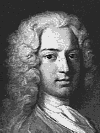The Bernoulli family
One of the most distinguished families in the history of mathematics and science is the Bernoulli family of Switzerland, which from the late seventeenth century on, produced an unusual number of capable mathematicians and scientists. The family record starts with the two brothers, Jakob Bernoulli and Johann Bernoulli.
They were among the first mathematicians to realize the surprising power of calculus and to apply the tool to a great diversity of problems.
Several things in mathematics now bear Jakob Bernoulli's name. Among these are the Bernoulli distribution and Bernoulli theorem of statistics and probability theory; the Bernoulli equation , met by every student of a first course in differential equations;the Bernoulli numbers, and Bernoulli polynomials first course in the calculus. In jakob Bernoulli's soulution to the problem of the isochrone curve, which was published in the Acta eruditorum, in 1690, we meet for the first time the word integral in a caculus sense. Leibniz had called the integral calculus calculus summatorius; in 1696, Leibniz and Johann Bernoulli agreed to call it calculus calculus integralis.
Johann Bernoulli was an even more prolific contributor to mathematics than was his brother Jakob, Though he was a jealous and cantankerous man, he was one of the most successful teachers of his time (Leonhard Euler was his pupil). He greatly enriched the calculus and was very influential in making the power of the new subject appreciated in continental Europe. It was his material that the Marquis de L'Hospital (1661-1704), under a curious financial agreement with Johann, assembled in 1696 into the first calculus textbook. In this way, the familiar method of evaluating the indeterminate form 0/0 became incorrectly known in later calculus texts as L'Hospital's rule.
The Bernoulli family tree :
Jakob Bernoulli Johann Bernoulli
Johann Bernoulli 
Jacob Hermann Nicolaus II
Nicolaus II
Daniel Bernoulli Johann II
Johann II
Johann Bernoulli III Jacob II
Jacob II
Johann Bernoulli had three sons, Nicolaus (1695-1726), Daniel(1700- 1782), and Johann II (1710-1790), all of whom won renown as eighteenthcentury mathematicians and scientists. Nicolaus, who showed great promise in the field of mathematics, was called to the St.Petersburg Academy, where he unfortunately died by drowining, only eight months later. He wrote on curves, differential equations, and probability. A problem in probability, which he proposed from St. Peresburg, later became known as the Petersburg paradox. The problem is:If A receives a penny when a head appears on the first toss of a coin, two pennies if a head does not appear until second toss, four pennies if a head does not appear until the third toss, and so on, what is A's expectation? Mathematical theory shows that A's expectation is infinite, which seems a paradoxical result. The problem was investigated by Nicolaus' brother Daniel, who succeeded Nicolaus at St. Petersburg. Daniel returned to Basel seven years later. He was the most famous of Johann's three sons, and devoted most of his energies to probability, astronmy, physics and hydrodynamics. In probability he devised the concept of moral expectation, and in his Hydrodynamica, of 1738, appears the principle of hydrodynamics that bears his name ( Bernoulli's principle) in all present-day elementary physics texts.
Johann II, the youngest of the three sons, studied law but spent his later years as a professor of mathematics at the University of Basel. He was particularly interested in the mathematical theory of heat and light.
There was another eighteenth-century Nicolaus Bernoulli (1687-1759), a nephew of Jakob and Johann, who achieved some fame in mathematics. This Nicoiaus held, for a time, the chair of mathematics at Padua once filled by Galileo. He wrote extensively on geometry and differential equations. Later in life, he taught logic and law.
Johann Bernoulli II had a son Johann III (1744-1807) who, like his father, studied law but then turned to mathematics. When barely nineteen years old, he was called as a professor of mathematics to the Berlin Academy. He wrote on astonomy, the doctrine of chance, recurring decimals, and indeterminate equations.


1 Comments:
macchi are you pasting these from a site? or r u writing them? :-)
y dont u can post ur own articles too?
Koushik
Post a Comment
<< Home